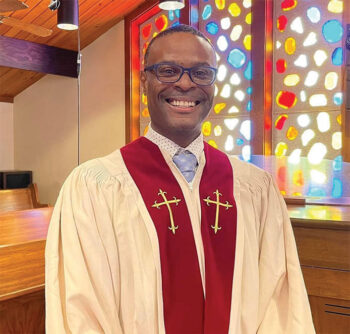
Rev. Derrick Elliott
Rev. Derrick Elliott
My relationship with God and the church began at a very young age, and I was exposed to the full range of Christian discipleship. These exposures enabled me to study and learn about what it means to be a follower of Christ, a Christian, through Sunday school, weekly bible study, prayer meetings, and attending church services. The central theme of my youth was God’s grace and mercies, and they reinforced and solidified my journey in forming a relationship with God, the Son, and the Holy Spirit.
I remember reading the Bible to my illiterate grandfather (Pawpaw) in my youth. My grandfather had limited education and had to quit school to work to feed the family. My Pawpaw instilled in his children and grandchildren the importance of education. He enjoyed listening to the passages of the Bible, and I loved reading it to him. I think my grandfather was one of the reasons I became a teacher in one of my former careers. As I sit in my office at Sun Lakes United Church of Christ, I reflect on those moments I spent with my grandfather and wonder how many people take the time to read or listen to the Bible without bias towards or against faith traditions. The Bible is a top-selling book of all time. In Timothy Beal’s book, The Rise and Fall of the Bible, he said, “There seems to be no correlation between reading and revering it (bible). The Bible appears to be the most revered book never read.”
Many revere biblical stories; however, sometimes, we need to ensure that we don’t read the stories in the Bible out of context. Context is the key to understanding each passage when we are studying the Scriptures, preaching, and sharing the gospel with others. If we read the Bible out of context, we may be tempted to make it say what we want it to rather than what the writers of the text want it to say about God.
The Bible has been a source of comfort, hope, and love, and the Bible has also been a source of anxiety, fear, and oppression. You don’t have to be a scholar to enjoy and understand the Bible to gain hope and inspiration; however, the Bible is complex with a rich historical and social context one must understand. That’s why a good study Bible is needed to help read the Bible in context. Moreover, it should not be considered as one book, but a collection of 66 books divided into the Old Testament and the New Testament. These collections of books for Christianity tell the narrative of who God is and who Christ is. It is a collection of stories about Jesus’ mission and ministry and how we should model his life for wholeness and display God’s love.
